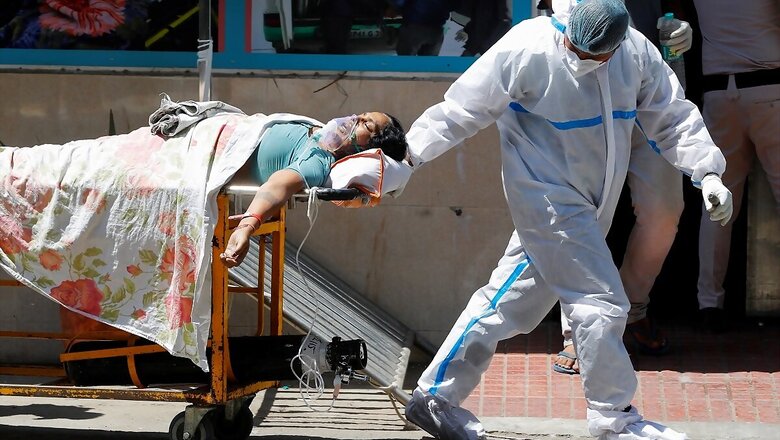
views
India has declined assistance offered by the United Nations of its integrated supply chain for COVID19-related material, saying the country has a “robust system” to deal with the required logistics, a spokesperson for UN Secretary General Antonio Guterres said. “One of the things we did is we offered the assistance of our integrated supply chain if it was required. We’ve been told at this point that it’s not needed because India has a reasonably robust system to deal with this. But our offer stands, and we’re willing to help in whatever way we can,” Farhan Haq, Deputy Spokesman for the UN Chief, said in response to a question by PTI.
On whether any shipments of essential materials from UN agencies are expected to reach India amid the crisis, Haq said, “none have been sought so far, but like I said, we do have people, including our people who deal with operational and logistical issues who are willing to help, if we’re needed, and we’re in touch with our counterparts in India to see whether that will be useful.”
As India battles a crippling surge in COVID-19 infections and deaths, the United Nations has been in touch at various levels with authorities in India.
Haq said Chef de Cabinet to the United Nations Secretary-General Maria Luiza Ribeiro Viotti has been in touch with India’s Permanent Representative to the UN T S Tirumurti over the COVID-19 situation in India and other officials in the system have also been in touch with officials both here in New York and on the ground.
Haq added that the UN is also making sure that its own staff, whether international or national, in India are taken care of so that they don’t place a burden on the healthcare system of India. “And luckily, we’ve maintained a very low level of cases. So, we’ve, I think, been succeeding at trying to do that and making sure that we’re not pressuring a healthcare system that already is facing extreme challenges.
Earlier, during the daily press briefing Tuesday, Haq said in India, UN colleagues on the ground continue supporting authorities and communities to tackle the impacts of the pandemic.
He said UN entities have been training health workers, including 10,000 nurses through UN Women initiatives and the UN team has also partnered with employers’ and workers’ organisations to promote jobs and entrepreneurship opportunities.
Haq said 11 help desks and on-site counselling activities on COVID-19 prevention and business continuity were set up by the UN Development Programme (UNDP), the UN Industrial Development Organisation (UNIDO) and the International Labour Organisation (ILO) and these have benefitted over 140,000 employees.
UNIDO also developed an online platform to help companies bounce back from the crisis, tailored to smaller businesses, while ILO helped over 100,000 self-employed workers to access social security measures and training on safety and health.
“We are also focusing on getting jobs for 10 million young people, Haq said, adding that over 13,000 women and youth, including returnee migrants, are being trained through entrepreneurship programmes led by UN Women and ILO.
A web portal from the UN Economic and Social Commission for Asia and the Pacific (ESCAP) to boost e-commerce has benefitted 950 women entrepreneurs in small and medium businesses.
In response to another question about the resurgence of the COVID-19 variant in India and whether major political rallies or religious festivals should be held during the pandemic, Haq said he will leave it to colleagues at the World Health Organisation to give a more formal evaluation about this.
“We’ve been warning about the sort of precautions that need to be taken in every country, and certainly, we want to make sure that all of the various precautions that have been recommended by the World Health Organization are followed through by every country.”
Haq stressed that at this stage, one of the lessons that must be clear is that until the COVID-19 pandemic is essentially confronted and defeated in every country, it won’t be solved for any country.
“Although there are different places that are thankfully making progress with measures, including vaccinations or local quarantines or other different precautions, we have to remain vigilant, he said.
As the Secretary-General has made clear, “we have to cooperate and nations have to cooperate with each other to make sure that COVID-19 can be defeated in every nation because you can always get areas, different countries or different variant strains, that can, again, cause a huge problem, not just for one nation but for regions and, ultimately, for the world, Haq said.
Expressing worry over the surging coronavirus cases in India, President of the UN General Assembly said it is time for the world to extend help and support to the country, which had supplied crucial COVID19 vaccines to vulnerable nations.
“I’m worried about the #COVID19 situation in India, a country which did so much to ensure #Vaccines4All in vulnerable countries. It’s time for the world to extend aid & support to India. No one’s safe until we’re all safe, President of the 75th session of the United Nations General Assembly Volkan Bozkir tweeted Tuesday.
He added that his thoughts are with the people of India at this time.
India’s Permanent Representative to the UN Ambassador Tirumurti replied to Bozkir’s tweet, saying India deeply appreciates “your sentiments and solidarity at this juncture.”
Read all the Latest News, Breaking News and Coronavirus News here. Follow us on Facebook, Twitter and Telegram.













Comments
0 comment